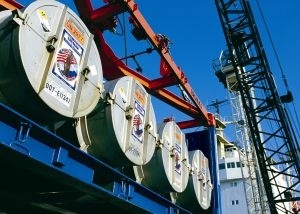The United States Congress ratified on Friday a long awaited civilian nuclear agreement with Russia that is meant to boost cooperation on nuclear research, production trade and nonproliferation issues between Moscow and Washington that will also allow for the dicey construction of a uranium fuel bank in Angarsk in Siberia.
Both the US and Russia nuclear establishments rushed to praise the ratification of the pact – called the 123 agreement because its requirements are set in section 123 of the U.S. Atomic Energy Act – as a business opportunity and a way to reign in nuclear proliferation.
But the environmental sector remains more circumspect, especially because of the new trove of nuclear waste the uranium bank in Russia will bring with it.
The environmental community is also concerned about the agreement’s apparent intentions to foster the exploration of fast neutron reactors, a highly experimental form of reactor that produces fuel grade plutonium in its spent nuclear fuel.
Such reactors largely exist on paper, except for one in operation at the Belyarsk Nuclear Power Plant in Russia. The long time holy grail of the Russian nuclear industry, fast neutron reactors are fraught with hazardous engineering difficulties.
Yet more environmental concerns arise with the 123 agreement’s implication that US origin spent nuclear fuel will now be stored in Russia.
These concerns are, as yet, not echoed by highly placed US and Russian nuclear officials.
U.S. Deputy Energy Secretary Daniel Poneman told US news agencies that the 123 agreement would help boost nonproliferation efforts and create new business opportunities.
“It’s going to allow the U.S. and Russia to deepen our existing cooperation on nonproliferation and nuclear security… it’s going to help to create opportunities to bring nuclear power cooperation to a new level,” Poneman told the Associated Press.
“It’s going to provide, I think in both countries, opportunities for industry to cooperate, create prosperity, create jobs, create energy.”
The deal did not require congressional approval, but Congress could have rejected it within 90 days of continuous session — a period that elapsed Thursday without a vote of disapproval. George W. Bush submitted the deal with Russia to Congress in May 2008, but withdrew it a few months later over the August 2008 Russian-Georgian war.
President Barack Obama resubmitted the agreement to Congress in May as part of his efforts to “reset” ties with Russia that also included the New START — a pivotal nuclear arms reduction treaty signed in April.
Poneman said the pact would come into effect after a formal exchange of notes.
Russia’s ministry of foreign affairs also welcomed the ratification, noting that the agreement creates “the necessary legal framework for the development of full scale cooperation in civilian nuclear energy,” the Russian daily Kommersant reported.
On December 7, after meetings with Poneman, Sergei Kiriyenko, head of Russia’s state nuclear corporation Rosatom, enumerated various areas of potential cooperation between the United States and Russia. These include, according to Kiriyenko, the creation of a closed nuclear fuel cycle – one that relies on reprocessing spent nuclear fuel to fabricate new fuel – a process that has been banned in the United States since the administration of Jimmy Carter.
Kiriyenko pointed out that neither the United States nor Russia have complete technology to make such a fuel cycle work, and that cooperative efforts will be focussed in this direction, Kommersant reported.
A second area of cooperation as envisioned by Kiriyenko, is the development of fast neutron reactors, high temperature reactors and reactors that supply small amounts of power.
Kiriyenko hinted that the future may hold a shift to the United States and Russia establishing joint enterprises and offering a “joint product,” but did not give any further details, Kommersant reported.
Sergei Novikov summarized that the 123 agreement, “will allow us to pursue nuclear cycle projects, including uranium enrichment and production of uranium fuel.” Novikov underscored that, “Another important prospective area is joint work on next generation nuclear reactors, including fast neutron reactors.”
Russia, one of the world’s biggest sellers of enrichment services, has been trying to break into the nuclear markets of the United States and the European Union to compete with giants like Eurodif, Urenco and the United States’ USEC.
By the same token, Russia has been trying for almost a decade to convince the United States to store spent nuclear fuel on its territory, noted Bellona Russian nuclear industry expert Igor Kudrik when the pact was initially inked in 2008. The deal, said Kudrik, “may pave the for the old idea of storing (…) American spent nuclear fuel on the territory of the Russian Federation.”
At that time, Kurdik noted that in 2002, the year following the Kremlin’s go ahead for Russia to accept spent nuclear fuel from abroad, the lack of a civilian nuclear agreement between the US and Russia was the main impediment to the United States sending spent nuclear waste to Russia. Russia projected at the time that it could make $20 billion on accepting foreign spent nuclear fuel for reprocessing, but figures have fallen well short of projections.
“The United States has fuel stored in Asian countries. And they may now be interested in storing it in one single location, namely, the Russian Federation,” said Kudrik in 2008.




